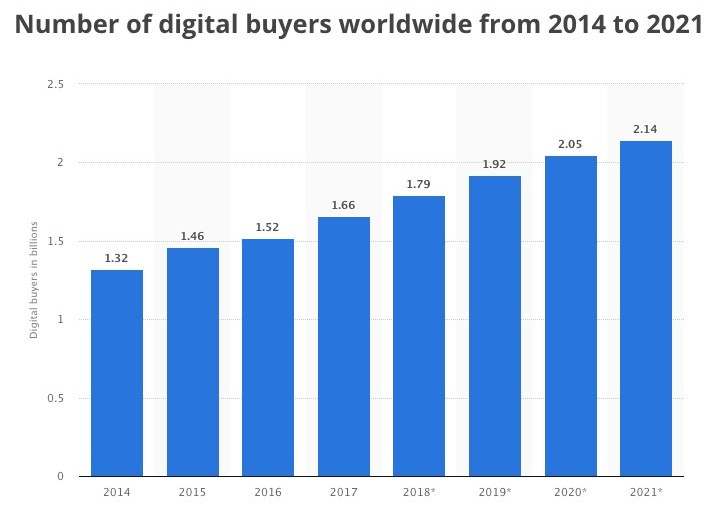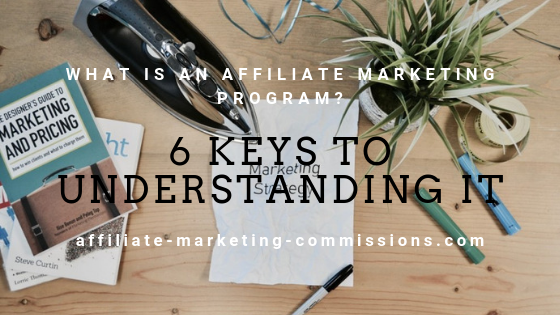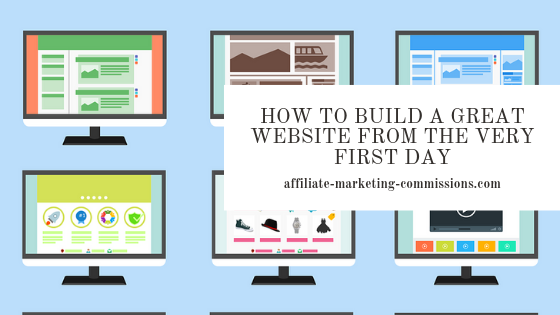
What is ‘online affiliate marketing’?
‘Online’ and ‘affiliate marketing’ in the same sentence?
Is not it a pleonasm?
Well, not.
Although the term ‘affiliate marketing’ it is for many people an activity that only can be conceived online, actually it refers to a broader concept that could encompass an undefined period before the Internet age and the web.
In fact, there is an affiliate marketing realm offline which can work without any of the more advanced technological resources and even any of them. It has certain similarities with the online counterpart, but they are not necessarily related even though they can be used in parallel for some marketers.
Affiliate marketing is not limited to the internet

Let’s image a grocery store before the Internet era. Its owner needs to make more sales for the end of the month to reach a pre-established goal or to have more money to pay the mortgage on his house or to have more cash available to invest in more products or simply he wants to earn more money to be more productive than the previous month.
So one of the strategies he could have used was to make a deal with one of his best customers to give them a discount coupon at the end of a determined period if they can refer some of their friends to buy from his store. He would have made some different color cards, one color for each one of his preferred customers to distribute among those people they would consider as good candidates to go to the store.
After the previously agreed period, he would join with those preferred customers to count how many of the specific cards they were given returned to the store to credit to their accounts and to calculate the amount of the discount coupon offered at the beginning based on the number of cards effectively used for customer friends in shopping.
Does this story sound familiar? Well, this is precisely offline affiliate marketing and has been there for as long as you can imagine, people have been interested in increasing their sales by making win-win deals of this kind.
Offline marketing is also profitable, but …
Let’s continue with the previous story. With the discount coupon or bonus the owner offered to his preferred customers for a determined amount of cards returned, they could buy one or more items without spending extra money, and that was an excellent benefit.
However, let’s change now the end result of this deal. Let’s suppose that the final reward was not a discount coupon, but  cash, a few cents per referred friend or a specific percentage over the final price of each item bought.
cash, a few cents per referred friend or a specific percentage over the final price of each item bought.
The owner would be devious and suspicious that you started making money at his expense. In other words, he puts the place and the products, and you only dedicated yourself to bringing people, so he could have decided to set some limits to the amount that you were able to accumulate.
But if he were smart enough, he would understand that it doesn’t matter that you are earning money because he is earning money too. On the other hand, he might not have made that extra money without your participation. That meant that he opened the option for their customers to bring as many people as they could regardless if they were their friends or even if they don’t know them at all.
Then their customers had an opportunity to make extra money and asked for the owner to give them as many color cards as he could to go out and distribute to a lot of people, as many as they could find on the streets, their children’s school, their offices, etc.
At the beginning of the ‘campaign’, as the owner decided to call it, a lot of people came to the store to change their cards and get a little discount or a bonus and the ‘preferred customers’ now called the ‘associates or affiliates’ could make a growing amount of money for a while. As in fairy tales, everyone was happy but not forever.
It happened that as the colored cards were distributed nearly all the population in town had one or many of them, so the affiliates went to the neighboring cities to distribute in the same way. However, as the distance to the grocery store increased in the same way, the visits to it were less and less.
The people in town now had lost their interest, or maybe a supermarket arrives at the city an offered not the only discount which the grocery store owner could not compete with or perhaps the supermarket offered another product not available previously in town nor in its surroundings, etc.
Offline marketing is still a current strategy for many businesses, even the big brands, but as long as it is based on physical facilities and stocks, it has a diverse kind of limitations.
Online marketing has no limits
Imagine one more time to our old friend, the grocery store owner, who finally arrived in the Internet era. He has the same needs, desires, or intentions as before, but now he has a connected computer.
At present, he is in the position to invite not only to his preferred customers and close friends but all people who are interested in promoting his business to others, in the whole world!
At the time of writing this post, the current world population was around 7.7 billions of people, 57% of this population, approximately 4.4 billion are internet users and about 5.1 billion unique mobile users. Just the internet users segment is growing at a rate of 9.1%.
The people interested in the products of our friend’s store in the other side of the world don’t have to travel to buy something because now they can pay online and shipping will be available to a wide range of regions.
And we almost forgot something, instead of using color cards, the affiliates of our friend around the world, who now count by thousands have a tracking number to know who are they recommending to buy in the store.
Offline affiliate marketing for an online business?
We have talked so far about the owner of the grocery store, but most of us play the role of the ‘preferred customers or close friends’ in other words ‘affiliates.’ Take a look at what would have been your behavior in an offline context.
You got the agreement with the owner and the promotion cards. You know that you can promote whoever you want, but approaching to the first person on the street would seem a little bit rude, at least is what you think at that moment. So you try to do it first in your comfort zone, going to those people that you know best, relatives and friends.
You don’t leave the promotion card on the floor of the entrance, in front of the door but calling the people and telling them  what this promotion about is and where they can get it. Probably there is no need to say more. However, if people ask something, you can answer their questions even if they are interested in whether you are getting a commission or not. Because now you are developing this activity to earn money, and if you are serious you can consider yourself as a professional in that field and have all the information people could ask from you, isn’t it?
what this promotion about is and where they can get it. Probably there is no need to say more. However, if people ask something, you can answer their questions even if they are interested in whether you are getting a commission or not. Because now you are developing this activity to earn money, and if you are serious you can consider yourself as a professional in that field and have all the information people could ask from you, isn’t it?
After you get a little bit of confidence in yourself, you can dare to do the same not just with your family and acquaintances but with unknown people from your neighborhood of other parts of the town.
Well, that kind of process should be transferred almost in the same way to the online world. Why should it be otherwise?
Personal treatment for a global audience?
At the beginning of an online business could seem that communicating something should be easier than in the offline world. It doesn’t matter if we are teaching, educating, sharing, promoting, advertising, or frankly selling out.
Why? Because we are not seeing or talking face to face with the other people not to mention that we don’t know who they are, where they live in, what are they interested for, etc.
So our first impulse is just to leave a message there ‘online’ exposed to the millions of internet users guessing (or hoping) that some hundreds or thousands, with all certainty, will take our offer.
Well, this doesn’t work this way, and at the end of a particular time, we will be disappointed because none of those millions of people picked up our message nor clicked over our affiliate links.
Why? Because we are not being ‘personal.’
What does it mean? It’s true that millions of people are coming daily to the internet and that a lot of those people are buying something. According to Statista, there are 1.92 billion people who have bought or will buy something in 2019, that is nearly half of the internet users.
However, it is a mistake to think that all of these millions are people compulsive for shopping. Sure, there will be a bunch of them, but the massive rest of others are coming to the internet looking for something ‘specific,’ to solve a particular doubt or a problem, or to improve something in their lives, homes, work centers, schools, etc.
When they find something they might be interested in according their search, the next step conscious or unconscious is to know if there is a human being in the other side who have been in their shoes and talk to them on a personal level. Have the author of this post personal experience with that product, service or situation? or Does this person tell me honestly what the best solution for my problem is? Does he/she know what am I looking for specifically or he/she is just trying to sell me his/her stuff any cost? Do I feel that he/she made an effort to bring a valued piece of information or he/she is just gathering nonsense wordiness?
In an online relationship like in any other offline analog, the human part is crucial. It doesn’t matter that people don’t know you physically. If they feel through your words that what you say is honest, and can give something of value to their lives, they will pay attention to what you have to tell them, including your affiliate offers. That’s the personal part that online world should never lose.





2 thoughts on “What is online affiliate marketing, and what is the difference with the offline option?”
Could not agree more with the fact that online can and should be approached from a personal angle. We have become such a tech nation that the mere thought of being personable in business is almost unheard of anymore. However that can also be the affiliate marketers greatest asset simply by being available.
A valuable thought experiment. Analogizing affiliate marketing into the physical world really helped me to grasp its concepts. The most important of these, as you point out, is the personal human connection. A successful encounter between an affiliate marketer and potential customer, should not be a sales call but a conversation. If you try to browbeat someone into buying something, they will usually resist. But if, in the course a a conversation, you mention an item you think highly of and think might be good for them, too, they will be much more receptive.